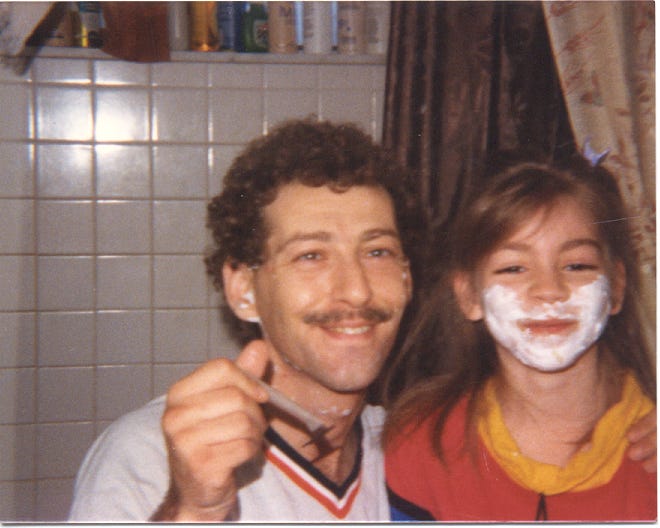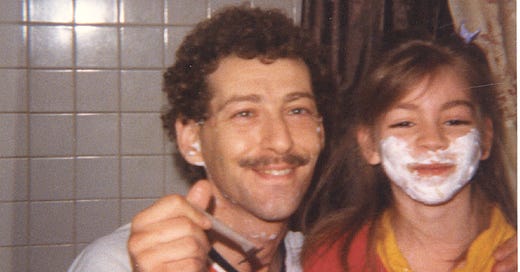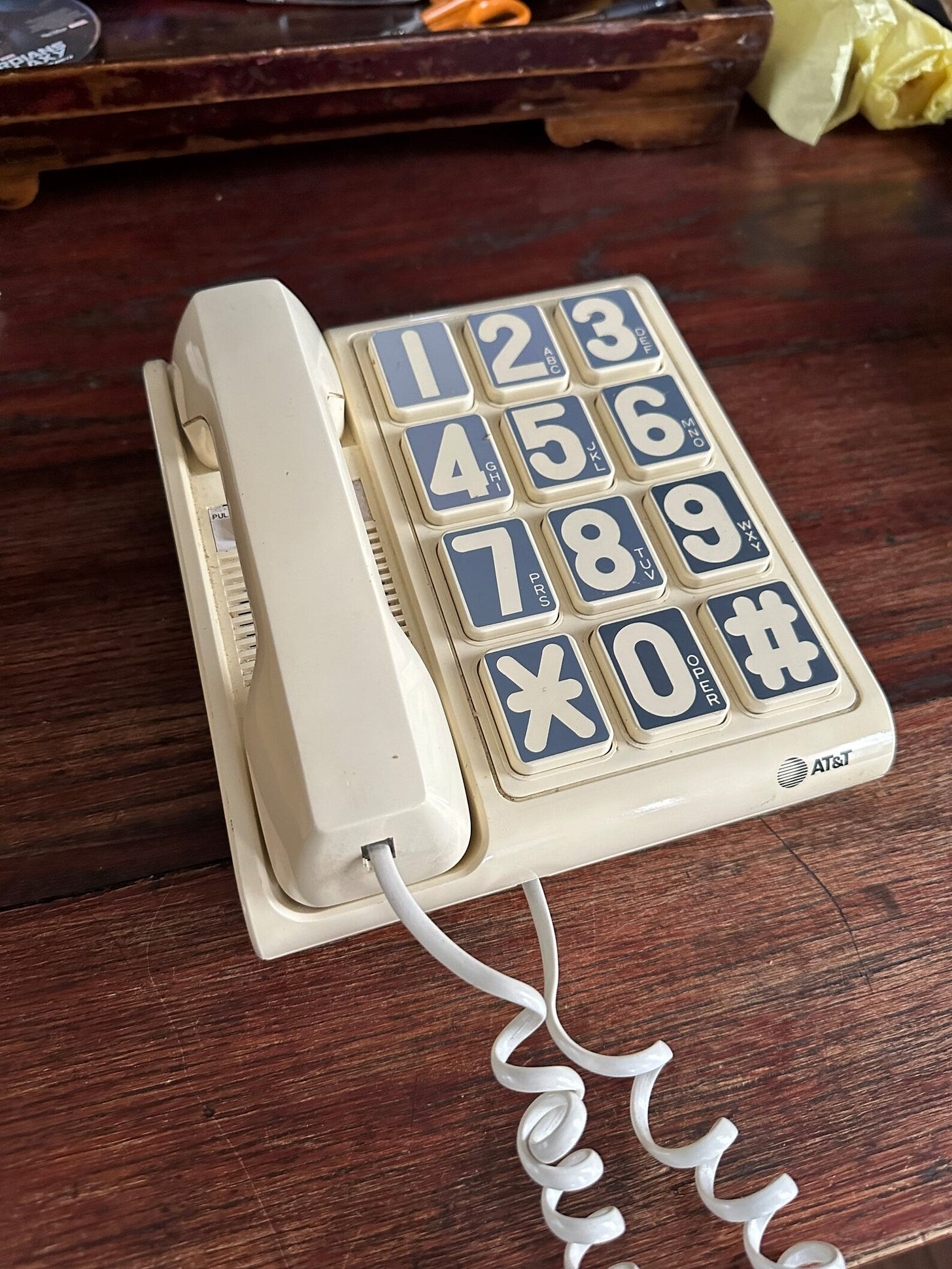Content Warning:
drug addiction
The girls are finally asleep. I'm standing in the dimly lit kitchen after eating their chicken leftovers that sat on the counter for so long the edges were yellowing and crusted, but I can’t bear the thought of wasting food. The weight of the day is slowly seeping from my mind to my shoulders, down my arms and through my fingertips. I stretch my chin high and my shoulders low, taking a deep yogic breath in my attempt to release the day's collective chaos that took up residence in my chest. I am stuck, not able to transition into the next stage of the evening—in limbo between kid bedtime and my own. What to do with this pocket of time? There is a long list of possibilities, and the decision fatigue wins out in paralysis.
I turn to Amazon Prime to squash the 13+ hours of screaming, laughing, barking, crying, thumping and bumping, and my own voice ringing in my ears. Holiday sales are drawing people in to spend their last pennies on items so spectacular they must get them at this discounted price. I scroll on, numbing my brain for a bit. And there it is. A waffle iron with a reservoir on the side to catch the overflow of batter, to hold space when there is just too much. It’s genius. I am suddenly aching for this waffle iron1 that so deeply gets me and my overwhelm.
While I superficially understood the figurative meaning of "holding space" for someone and have heard the term countless times before, conceptually I had yet to digest it on this deeper level. I’m a very visual person, so this representation drives it home. The image of this overflow channel will forever pop into my mind when I hear of or consider holding space for someone.
Around this season it’s easy for me to slip back in time, and my mind drifts to ponder moments when I was learning to hold space before it was such a popular catchphrase. It was 1996, the 7th of December. Under my favorite hunter-green sweatshirt I wore my boyfriend’s silver chain, hoping it would bring me comfort and strength on this day that I have dreaded. The day I had to face my dad for the first time since he ended our relationship, lashing out at me through his clouded pain and addiction.
I hadn’t seen my dad in person for a long while before this—I honestly don’t recall when the last time was. Six months? A year?
Maybe it was the time he taught me how to blow smoke rings in the darkened parking lot of a Chinese restaurant where we met extended family for a celebration—an anniversary and a birthday, I think. I always felt anxious if he was coming to an event, wondering which version he would be; I was relieved to find Dad was mentally present this time. Both of us feeling a bit out of place and eager to escape, we connected over a cigarette break from the cheery façade looming inside.
I remember feeling a shift in our relationship as he allowed such a taboo act of smoking together, though I was only 15 at the time. We both wore quilted flannel jackets to keep warm (an odd similarity between us considering our lack of time spent together). It was already dark early in the evening, I believe it was late fall. The rain-soaked asphalt reflected glowing plaza signs and rows of lights throughout the parking lot. His cigarette flared brighter as his cheeks hollowed to draw in more smoke. He turned to face a light post to illuminate the rings rolling and expanding as they drifted toward the sky, his Adam’s apple bobbing with each one. We giggled as he coached me to round my lips and coax my tongue just right until I finally got it! It was such a simple amusement and diversion as we played hooky from the gathering in the restaurant. But those bonding moments were rare between us, so the memory remains precious and clear.

One of the last times I heard my dad’s slurred speech was on the answering machine. He said he missed me and wanted to see me for Father’s Day, which was also near my birthday. I could hear the drugs in his lower tone of voice as his vocal cords limply attempted their job. When he called again a week later, he sounded more clear-headed, but I told him I couldn’t visit in his condition. He claimed to be clean, but I snapped back that just a week ago he was not, and I needed to know he could stay clean longer before I visited again.
I couldn’t bear to see it in person anymore. His heavy, hooded eyes, slow-mo body movements, words stumbling on each other. A limp arc of ash branching from the end of his cigarette, mirroring his posture and instability. I’d had enough. There’s no telling who he would be when I got there. Just as bad is when he would abstain from drugs for a visit or the weekend if I was staying with him. His dependent body struggled to function without those chemicals flowing through his veins. He became restless and jittery with jerky movements, reddened shaky hands fought to accomplish menial tasks, and an overall dis-ease wafted from him.
It was many years before I came to understand that restraint as his effort to be free from drugs for our time together, not realizing this version of him was no better than the zombie. Both overwhelmed my empathic nature long before I understood the difference between my feelings and when I was feeling someone else’s. Visits with Dad were so draining it could take me a week to feel like myself again. I just didn’t have it in me anymore. This time I chose to hold space for myself.
“Then there’s nothing left for us as father and daughter,” he declared.
“Ok then,” I answered, and that was it.
Despite his battle with chronic depression and addiction to excessive antidepressant drugs (and sometimes other varieties), I knew he loved me deeply, he always made sure of that. So, hearing him speak with such finality the first time I ever confronted him about the drug use was a jolt, as if it was my fault. I always knew when he was high. I’d known since I was 5 years old. But it took me almost 11 more years to admit it out loud to him, and that hit him hard. His reaction was too painful for me, so I shut it off as quickly as I hung up.
The following fall I found out he was in a rehab facility in New Baltimore, Michigan. I believe this was the first time he was ever willing to do an inpatient program, so there was talk that maybe this would be different, but it didn’t matter to me. He wanted us to visit him on December 7th, the program’s “family day,” maybe to make amends? But I was prepared to stand up to him and tell him I wanted nothing more of this. I had trusted in his recoveries and been let down too many times before. I couldn’t sleep for days leading up to the visit, playing in my head all the things I would say to him—words I spent my whole childhood holding in, scared of what might happen if I acknowledged the dazed elephant in the room.
Since my parents were divorced over a decade before, it was just my sister and I going to this visit / counseling session. Looking back on it, I still can’t believe that my 22-year-old sister was tasked with this responsibility at her young adult age. But with an addict as a parent, adulting for his incompetence had become the norm for her.
To make matters worse, my sister’s car had been broken into recently, so before we made the 45-minute drive to the rehab facility, she needed to stop at the glass repair shop, maybe to drop off an insurance check for payment? I’m foggy on the details, but they closed earlier than she expected because it was Saturday, she couldn’t complete the task, and now it had to wait until Monday.

While she was known to be quick to tantrum—I hadn’t yet learned the intricacies of chronic stress and how it wreaked havoc on her nervous system—even then I knew these stacked circumstances warranted a meltdown. In other situations I may have judged her inability to compose herself, only years later gaining the awareness that her short temper was rooted in feeling deeply and living on the edge of fight or flight. Conversely, I was practicing the art of numbing my feelings to get through life and didn’t understand why everyone couldn’t do this. Neither one an example of desired emotional health. Both a result of chronic stress with no overflow channel. Our trauma manifested in opposite characteristics that entangled our interactions and relationships like weeds after a spring rain.
I remember standing outside the locked door of the glass repair shop, my sister’s anger erupting into tears, the stress of visiting our dad in rehab flooding her emotional capacity to also handle the checklist that came with her vehicle break-in. She needed an overflow channel, but all I had were my bare hands. So I just stood there, quietly holding space as she accepted defeat and we moved on to the next scoop of batter.

I saw him standing there, waiting to greet us with a smile and clear, focused eyes. I was relieved to see Dad, not the zombie. I felt a hint of my rigidity soften, but the knots in my stomach stayed clenched. The facility was decorated with a Christmas tree and décor to make it feel homey, which made my angsty teen self scoff at their attempt to put lipstick on a pig.
There was a face-painter brought in for the kids that day, and despite being Jewish, Dad had her paint a red and a green Christmas stocking on each of his cheeks; one with my sister’s name, one with mine. My mom was raised Catholic, so we were brought up with both sets of holidays (not so much religion). When Dad was healthy, he was always silly, clowning around, trying to make people laugh. The proud-to-be-Jewish guy with Christmas stockings on his face for his 16- and 22-year-old daughters made me chuckle, which I appreciated as his intent. Another layer of my rigidity melted.
Although he put this shining face forward, I could still read the pain in his eyes. I could still feel his despair permeate my soul like humidity on a 90-degree summer day, just begging for the rain to pour down and relieve the density in the air that hung between us. The wear and tear of his life-long struggles was palpable and smelled of stale cigarettes. This man was so full of love for others, yet too weak to surmount the pull of Xanax among his decades of drug addictions.
My memory is foggy on the details after that moment. This is my strongest era of dissociation. I know my sister and I followed Dad and a therapist into a private room. I listened as he talked. I cried. I don’t remember what was said but he was far from the man who laid in a hospital bed a few years prior, telling me that he hoped he wouldn’t wake up this time.
Hearing my father tell me he intended to die stirred up complicated feelings besides abandonment: shock, anger, pity, frustration, heartbreak. No matter how much I knew better about addiction and the way it grips the mind, my inner-child heart relentlessly echoed over the years, “Why am I not a good enough reason for him to live? Why can’t he love us more than the drugs?” It was another time when overwhelm lead to shutting down all emotions, numbing myself to not become stuck in despair like him.
Today he sounded more hopeful. Maybe we could be enough for him this time.
Though doubt felt like a fifth person in the room with us, by this point I was a little hopeful too, wanting to believe his intentions as much as he did. We had never done this rehab thing before, so maybe it would be different. I came here ready for battle but was quickly disarmed, my offense crumbled in the presence of his love that was always sincere. I was surprised by how accessible my love for him still was; that it was never actually gone. I had missed him so much—the real Dad, not the zombie or the jitterbug. It was just mixed into the batter with the hurt and disappointment and longing for him to actually be present in my life.
Was I holding space for him and his experience?
Was I holding space for myself and my mess of love-hate emotions that pulled me in too many directions to make sense of it all?
Or was I just a 16-year-old kid who froze when it was time to confront her father with the many years of pain he caused?
Maybe it was a little bit of everything; one of those moments when trust and doubt swirl together like a yin-yang, balancing each other out so neither is quite the winner in such a complex emotional battle.
All I know is that I am forever grateful that my premeditated argument melted into love and connection on this day, allowing my anger, pain, and statement of terminating our relationship to seep into the overflow channel for another time, should we end up in that cycle again. I am grateful that the last time I saw my dad alive ended with hugs and kisses and hope.

This personal day of infamy haunted my calendar for years until December 7, 2012, when after weeks of delays, my husband and I finally closed on our first family home, giving this date some emotional balance in my heart. While we had previously owned a small home for eight years, this is where we would start a family, our first child due just four months later. Little did I know that the birth of this child would generate a pivotal shift in my processing of childhood grief and traumas, guiding me to parent my inner child and grieve the parenting that I lacked.
Another connection to December 7 is a time when my dad rescued a neighborhood boy who was electrocuted. My mom remembers seeing him rush out the door and hop the fence like a gazelle—which was out of character for his clumsy self—before she even knew what was going on. She feels part of his life’s purpose was to save Scott that day in 1980 when I was just a baby.
This leaves December 7 as a complicated anniversary for me, one of pain, joy, growth and survival.

The holiday season is a tricky time for families with trauma and painful history, some that pour beyond the threshold of any reservoir. My wish is for all to get through it with grace that allows genuine love and peace to flourish, whether that be through connection with or space from family… as long as there’s waffles!
A friend from my writing group shared this song and it really spoke to me.
I did end up buying the waffle iron and it has lived up to its promise. The overflow channel creates soft mini-loaves that are clearly for the cook to nibble on while waiting for the next batch to cook, so pour a little extra batter and let it flow!







Wow, wow, wow. Thank you for offering this piece of your story, Leslie. You write with insight, generosity, and enthralling details. I hope writing and sharing is as much a gift to you as it to your reader. Even with your words, you hold so much space for nuance, paradox, and the complexities of loving someone who is hurting (and learning to love yourself). 💛
This piece is such a clear depiction of the depth each person contains. You tell the whole truth as you know it, and the world is better for it.